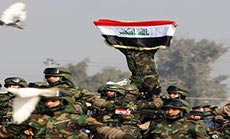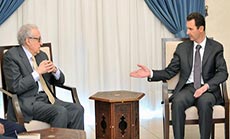
NYT: Arms Airlift to Syria Rebels Expands, With CIA Aid

Local Editor
The New York Times US daily revealed Monday that "with the help from the CIA , Arab governments and Turkey have sharply increased their military aid to Syria's opposition fighters in recent months."
 This escalation, according to air traffic data, expanded a secret airlift of arms and equipment against President Bashar al-Assad. "The airlift, which began on a small scale in early 2012 and continued intermittently through last fall, expanded into a steady and much heavier flow late last year," the data shows.
This escalation, according to air traffic data, expanded a secret airlift of arms and equipment against President Bashar al-Assad. "The airlift, which began on a small scale in early 2012 and continued intermittently through last fall, expanded into a steady and much heavier flow late last year," the data shows.
It also highlighted that "this has grown to include more than 160 military cargo flights by Jordanian, Saudi and Qatari military-style cargo planes landing at Esenboga Airport near Ankara, and, to a lesser degree, at other Turkish and Jordanian airports."
"And even as the Obama administration has publicly refused to give more than "nonlethal" aid to the rebels, the involvement of the CIA in the arms shipments - albeit mostly in a consultative role, American officials say - has shown that the United States is more willing to help its Arab allies support the lethal side of the civil war," the report viewed.
From offices at secret locations, American intelligence officers have helped the Arab governments shop for weapons, including a large procurement from Croatia, and have vetted rebel commanders and groups to determine who should receive the weapons as they arrive, according to American officials speaking on the condition of anonymity.
Meanwhile, the CIA declined to comment on the shipments or its role in them.
Most of the cargo flights have occurred since November, after the presidential election in the United States and as the Turkish and Arab governments grew more frustrated by the rebels' slow progress against the Syrian regime.
The Turkish government has had oversight over much of the program, down to affixing transponders to trucks ferrying the military goods through Turkey so it might monitor shipments as they move by land into Syria, officials said. The scale of shipments was very large, according to officials familiar with the pipeline and to an arms-trafficking investigator who assembled data on the cargo planes involved.
"A conservative estimate of the payload of these flights would be 3,500 tons of military equipment," said Hugh Griffiths, of the Stockholm International Peace Research Institute, who monitors illicit arms transfers.
"The intensity and frequency of these flights," he added, are "suggestive of a well-planned and coordinated clandestine military logistics operation."
Although rebel commanders and the data indicate that Qatar and Saudi Arabia had been shipping military materials via Turkey to the opposition since early and late 2012, respectively, a major hurdle was removed late last fall after the Turkish government agreed to allow the pace of air shipments to accelerate, officials said.
Simultaneously, arms and equipment were being purchased by Saudi Arabia in Croatia and flown to Jordan on Jordanian cargo planes for rebels working in southern Syria and for retransfer to Turkey for rebels groups operating from there, several officials said.
These multiple logistics streams throughout the winter formed what one former American official who was briefed on the program called "a cataract of weaponry."
American officials, rebel commanders and a Turkish opposition politician have described the Arab roles as an open secret.
Still, rebel commanders have criticized the shipments as insufficient, saying the quantities of weapons they receive are too small and the types too light to fight the Syrian military effectively. They also accused those distributing the weapons of being parsimonious or corrupt.
"The outside countries give us weapons and bullets little by little," claimed Abdel Rahman Ayachi, a commander in Soquor al-Sham group.
He made a gesture as if switching on and off a tap. "They open and they close the way to the bullets like water," he said.
Two other commanders, Hassan Aboud of Soquor al-Sham and Abu Ayman of Ahrar al-Sham, another extremist group, said that whoever was vetting which groups receive the weapons was doing an inadequate job.
"There are fake Free Syrian Army brigades claiming to be revolutionaries, and when they get the weapons they sell them in trade," Aboud said.
The former American official noted that the size of the shipments and the degree of distributions are voluminous.
"People hear the amounts flowing in, and it is huge," he said. "But they burn through a million rounds of ammo in two weeks."
On Jan. 3, 2012, a pair of Qatar Emiri Air Force C-130 transport aircraft touched down in Istanbul, according to air traffic data.
By late midspring the first stream of cargo flights from an Arab state began, according to air traffic data and information from plane spotters.
On a string of nights from April 26 through May 4, a Qatari Air Force C-17 - a huge American-made cargo plane - made six landings in Turkey, at Esenboga Airport. By Aug. 8 the Qataris had made 14 more cargo flights. All came from Al Udeid Air Base in Qatar, a hub for American military logistics in the Middle East.
American and other Western officials, and rebel commanders, have said Qatar has been an active arms supplier - so much so that the United States became concerned about some of the extremist groups that Qatar has armed.
The former American official said David H. Petraeus, the CIA director until November, had been instrumental in helping to get this aviation network moving and had prodded various countries to work together on it.
The American government became involved, the former American official said, in part because there was a sense that other states would arm the rebels anyhow. The CIA role in facilitating the shipments, he said, gave the United States a degree of influence over the process.
American officials have confirmed that senior White House officials were regularly briefed on the shipments. "These countries were going to do it one way or another," the former official said. "They weren't asking for a ‘Mother, may I?' from us. But if we could help them in certain ways, they'd appreciate that."
Through the fall, the Qatari Air Force cargo fleet became even more busy, running flights almost every other day in October. But the rebels were clamoring for even more weapons, continuing to assert that they lacked the firepower to fight a military armed with tanks, artillery, multiple rocket launchers and aircraft.
Soon, other players joined the airlift: In November, three Royal Jordanian Air Force C-130s landed in Esenboga, in a hint at what would become a stepped-up Jordanian and Saudi role.
Within three weeks, two other Jordanian cargo planes began making a round-trip run between Amman, the capital of Jordan, and Zagreb, the capital of Croatia, where, officials from several countries said, the aircraft were picking up a large Saudi purchase of infantry arms from a Croatian-controlled stockpile.
The first flight returned to Amman on Dec. 15, according to intercepts of a transponder from one of the aircraft recorded by a plane spotter in Cyprus and air traffic control data from an aviation official in the region.
In all, records show that two Jordanian Ilyushins bearing the logo of the Jordanian International Air Cargo firm but flying under Jordanian military call signs made a combined 36 round-trip flights between Amman and Croatia from December through February. The same two planes made five flights between Amman and Turkey this January.
As the Jordanian flights were under way, the Qatari flights continued and the Royal Saudi Air Force began a busy schedule, too - making at least 30 C-130 flights into Esenboga from mid-February to early March this year, according to flight data provided by a regional air traffic control official.
Several of the Saudi flights were spotted coming and going at Ankara by civilians, who alerted opposition politicians in Turkey.
"The use of Turkish airspace at such a critical time, with the conflict in Syria across our borders, and by foreign planes from countries that are known to be central to the conflict, defines Turkey as a party in the conflict," said Attilla Kart, a member of the Turkish Parliament from the CHP opposition party, who confirmed details about several Saudi shipments. "The government has the responsibility to respond to these claims."
The director of cargo for Jordanian International Air Cargo, Muhammad Jubour, insisted on March 7 that his firm had no knowledge of any flights to or from Croatia.
"This is all lies," he claimed . "We never did any such thing."
A regional air traffic official who has been researching the flights confirmed the flight data, and offered an explanation. "Jordanian International Air Cargo," the official said, "is a front company for Jordan's air force."
After being informed of the air-traffic control and transponder data that showed the plane's routes, Jubour, from the cargo company, claimed that his firm did not own any Ilyushin cargo planes.
Asked why his employer's Web site still displayed images of two Ilyushin-76MFs and text claiming they were part of the company fleet, Jubour had no immediate reply. That night the company's Web site was taken down.
Source: NYT, Edited by moqawama.org
Comments

France’s Hollande in Qatar for Warplane Deal
9 years ago
Iraq Police Dismantles Al-Qaeda Protest Site
10 years ago
